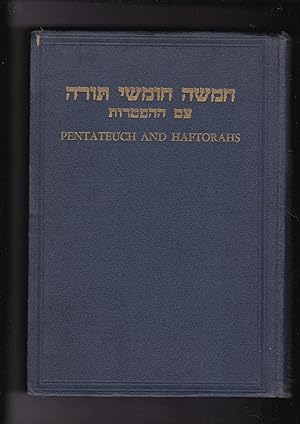About this Item
In Hebrew and English. (10), 564 pages. 256 x 180 mm. Inscribed by the editor, "To J. H. Biben Esq With the Best Wishes of J. H. Hertz." Joseph Herman Hertz (25 September 1872 ¿ 14 January 1946) was a Jewish Hungarian-born rabbi and biblical scholar. He held the position of Chief Rabbi of the United Kingdom from 1913 until his death in 1946. He was born in Rebrín/Rebrény, Kingdom of Hungary (presently part of the village of Zemplínska ¿iroká, Slovak Republic), and immigrated to New York City in 1884. He was educated at New York City College (BA), Columbia University (PhD) and the Jewish Theological Seminary of America (Rabbi, 1894, the Seminary's first graduate). His first ministerial post was in Syracuse, New York. In 1898, he moved to Transvaal, South Africa, to the Witwatersrand Old Hebrew Congregation in Johannesburg, staying there until 1911, despite attempts by President Paul Kruger in 1899 to expel him for his pro-British sympathies and for advocating the removal of religious disabilities of Jews and Catholics in South Africa. He was Professor of Philosophy at Transvaal University College (later known as the University of the Witwatersrand), 1906-8. In 1911, he returned to New York to the Orach Chayim Congregation. In 1913, Hertz was elected Chief Rabbi of the United Hebrew Congregations of the British Empire, holding the post until his death. His period in office was marked by many arguments with a wide variety of people, mainly within the Jewish community. He was in favor of resolving disagreements by calm discussion ¿ when all other methods had failed. Despite his title, he was not universally recognized as the final rabbinical authority, even in Britain. While he was Chief Rabbi of the group of synagogues known as the United Hebrew Congregations of the British Empire, led by the United Synagogue, some new immigrants who had arrived since the 1880s regarded it as insufficiently orthodox. Hertz tried both persuasion and such force as he could muster to influence them; he added to his credibility among these immigrants by persuading Rabbi Yehezkel Abramsky to become head of the London Beth Din. Hertz antagonized others by his strong support for Zionism in the 1920s and 1930s, when many prominent Jews were against it, fearing that it would lead to accusations against the Jewish community of divided loyalty. Hertz was strongly opposed to Reform and Liberal Judaism, though he did not allow this to create personal animosities, and had no objection in principle to attending the funerals of Reform Jews. However, despite all this, his eloquent oratory, lucid writing, erudition and sincerity earned him the respect of the majority of British Jews and many outside the Jewish community. His commentary on the Torah is still to be found in most Orthodox synagogues and Jewish homes in Great Britain. Although Hertz vigorously denounced the horror of the Holocaust, Hertz was opposed to the Kindertransport if it meant Jewish refugee children would be raised in gentile homes. Hertz edited a notable commentary on the Torah, popularly known as the Hertz Chumash, this classic Hebrew-English edition of the Five Books of Moses, with corresponding Haftarot, is used in synagogues and classrooms throughout the English-speaking world. He also edited a Hebrew-English edition of the Jewish Prayer Book or Siddur (1946), and contributed to the Jewish Encyclopedia and the Encyclopedia Britannica. Seller Inventory # 011238
Contact seller
Report this item
Bibliographic Details
Title: THE PENTATEUCH AND HAFTORAHS Hebrew text, ...
Publisher: Metzudah Publishing Company, New York
Publication Date: 1941
Binding: Hardcover
Condition: Very Good
Dust Jacket Condition: No Jacket
Signed: Inscribed by Author(s)
![]()



